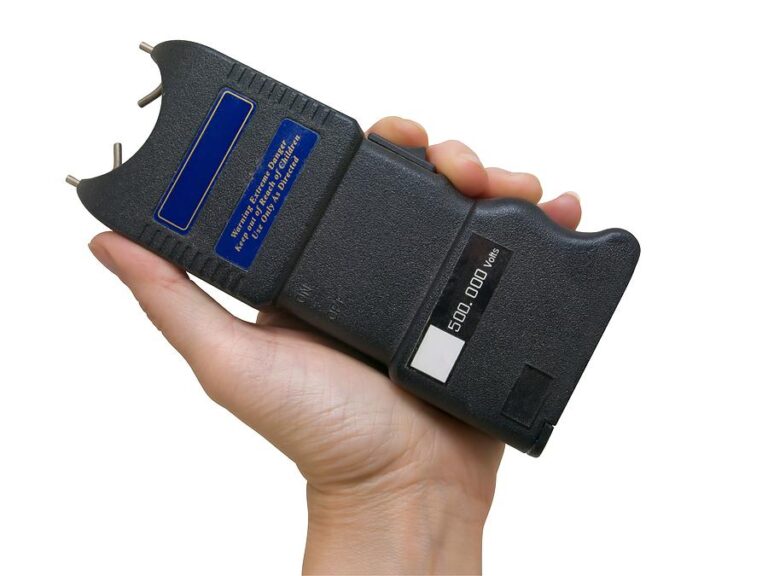Table of Contents
- Legal Requirements for Carrying Stun Guns in North Carolina
- Understanding Restricted Areas and Local Ordinances
- Proper Usage and Safety Tips for Stun Gun Owners
- Recommendations for Responsible Ownership and Compliance
- Closing Remarks
Legal Requirements for Carrying Stun Guns in North Carolina
In North Carolina, understanding the legal framework surrounding stun guns is essential for responsible ownership and use. The state law classifies stun guns as non-lethal self-defense weapons, making them available for civilian possession without the need for a license or permit. However, there are important stipulations to bear in mind to avoid legal complications. For instance, minors are prohibited from carrying or possessing stun guns, and individuals must be at least 18 years old to legally own one. Additionally, the device must be carried in a manner that does not cause public alarm or appears to be used as a weapon in an unlawful manner.
Certain locations and circumstances impose restrictions on carrying stun guns. These include:
- Schools and educational institutions: Carrying stun guns is strictly forbidden within school zones.
- Government buildings: Many government offices prohibit stun guns on their premises unless authorized.
- Airports and federal properties: Federal law supersedes state law, so stun guns are often banned in these areas.
Understanding Restricted Areas and Local Ordinances
When it comes to carrying stun guns in North Carolina, it’s crucial to understand where these devices are prohibited. State laws often intersect with local ordinances and private property rules that may restrict possession and use. Common restricted areas include schools, government buildings, courthouses, and establishments serving alcohol. Additionally, certain events or venues may enforce temporary bans, so staying informed about local regulations before carrying a stun gun in public is essential to avoid penalties.
Local municipalities in North Carolina might impose their own restrictions beyond state laws, making it necessary to verify city or county codes. For example, some areas prohibit stun guns in parks, public transportation, or certain commercial zones. Property owners also have the right to ban stun guns on their premises, especially businesses like hospitals, stadiums, and places of worship. To ensure compliance, consider the following:
- Review local government websites for specific stun gun regulations.
- Check signage or contact property managers regarding restrictions.
- Understand that violations can result in fines or confiscation of the stun gun.
Proper Usage and Safety Tips for Stun Gun Owners
When owning a stun gun in North Carolina, it’s crucial to handle your device with the utmost care and responsibility to prevent accidents or misuse. Always ensure your stun gun is kept unloaded and safely stored when not in use, ideally in a secure location away from children or unauthorized individuals. Before carrying, familiarize yourself with the stun gun’s features and operation by reading the manufacturer’s manual thoroughly. Remember, practicing safe handling habits not only protects you but also those around you.
To further enhance safety, consider these essential tips:
- Always carry your stun gun in a holster or case designed specifically for it, preventing accidental discharge.
- Never rely solely on your stun gun for protection; stay vigilant and aware of your surroundings.
- Regularly check your stun gun’s battery and functionality to ensure readiness in an emergency.
- Do not use your device in crowded or public spaces where it could inadvertently affect bystanders.
- Understand and respect local laws regarding stun gun usage to avoid any legal complications.
Recommendations for Responsible Ownership and Compliance
To ensure the safe and legal use of stun guns, it’s crucial for owners in North Carolina to familiarize themselves with state and local regulations. Always carry your device discreetly and avoid using it in prohibited areas such as government buildings, schools, and private properties where weapons are banned. Responsible ownership also means only using stun guns in self-defense situations and never with malicious intent. Familiarize yourself with the distinctions between stun guns and other control devices under the law, as violations can lead to serious legal consequences.
Best practices include:
- Storing your stun gun securely in a safe place away from children and unauthorized users
- Regularly checking the device’s functionality to ensure it works properly when needed
- Completing a safety training or self-defense course focused on non-lethal weapons
- Keeping updated on any legislative changes regarding stun gun possession or use in your municipality
Closing Remarks
In conclusion, understanding the laws and regulations surrounding carrying stun guns in North Carolina is essential for anyone considering this form of self-defense. While stun guns can offer added personal security, being informed about legal restrictions ensures you stay compliant and avoid potential penalties. Always stay updated with local ordinances and consult official resources if you have questions. Responsible ownership combined with knowledge empowers you to protect yourself safely and lawfully in the Tar Heel State.Check Our Other Blogs
- StunGun – Your Trusted Source for Stun Guns, Laws, and Self-Defense Tips
- PepperSprayLaws – Your Trusted Resource for Pepper Spray Information
- StunGunLaws – Your Trusted Guide to Stun Gun Legality and Safety



